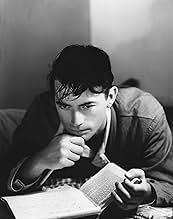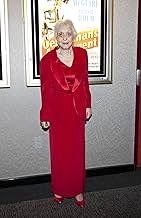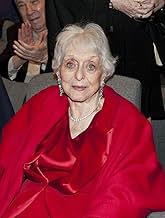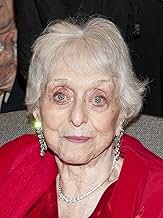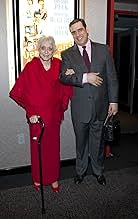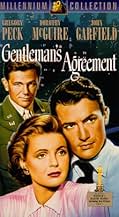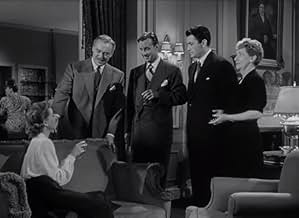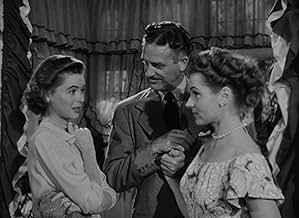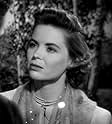A reporter pretends to be Jewish in order to cover a story on anti-Semitism, and personally discovers the true depths of bigotry and hatred.A reporter pretends to be Jewish in order to cover a story on anti-Semitism, and personally discovers the true depths of bigotry and hatred.A reporter pretends to be Jewish in order to cover a story on anti-Semitism, and personally discovers the true depths of bigotry and hatred.
- Director
- Writers
- Stars
- Won 3 Oscars
- 17 wins & 9 nominations total
- Bill Payson
- (as Ransom M. Sherman)
- Waiter
- (uncredited)
- Nightclub Patron
- (uncredited)
- Mother
- (uncredited)
- Director
- Writers
- All cast & crew
- Production, box office & more at IMDbPro
Featured reviews
Released the same year and touching on the same subject was Edward Dmytryk's Crossfire, which dealt with anti-Semitism at its extremes: murder with anti-Semitism as the motive. Gentleman's Agreement takes a more humanistic and subtle approach--one that is too subtle at times. Where Crossfire dropped the bomb of anti-Semitism into the laps of the audience, Gentleman's Agreement gives it to you in periodic shots in the arm in the form of a sermon, and each one says the exact same thing: anti-Semitism is bad. (But we knew that.) Yes, the message is an important one, but feeding it to the audience in a manner that is literally shoving it down our throats every few minutes doesn't help the digestion any.
Also lacking in Gentleman's Agreement is a three-dimensional protagonist. Peck's crusading writer who masquerades as a Jew is simply too zealous and unswerving for his own good. He has no faults, no inner conflicts and no doubts about himself. Whether he's being shunned by bigots or Dorothy McGuire, he's such a straight-shooter you know what he's going to do before he does: the right thing right away.
There's no real dramatic arc in the story, with the entire weight of the movie resting on the torrid on-again-off-again love affair between Peck and McGuire. She symbolizes the hypocrisy and passiveness of the everyday American on anti-Semitism, and he points it out to her every chance he gets-and that's all. It pretty much rambles on the same dramatic level all throughout the picture, dividing its time between love scenes and sermons, most of which are indistinguishable from one another.
In the end, the important message and the overall entertainment value of the picture suffers from this redundancy.
It's 2021 as I write. I watched this movie last night for the simple reason that there was nothing else on tv worth watching at 1 AM other than reruns of The Monkees. Seeing as how I love The Monkees, it's weird that I chose to watch this movie instead. I think I know why though.
The description doesn't do this movie justice. I almost changed channels after reading it, but one of the early scenes caught my attention and every scene after kept it. The more I watched, the further from shore I walked until it was impossible to swim back.
I am 62 years old and more set in my way of thinking than any other white male Georgia boy there is. Or so I thought. Thank God I was wrong. Born and raised a small town Confederate Conservative. Nuff said? No. That's one of the truths of this movie. Watch it and quit putting people in the groups that even today's society say are morally correct. Lesson learned.
Just by being who I am and where I'm from, I know what it's like to be stigmatized.
I'm a racist. That's the box the world says I belong in. That's the label in big bold letters that I wear every where I go. I always took pride in knowing the label was wrong. From that day long ago when I made friends with the first black kid to be placed in my elementary school after segregation, I have lived my life riding a different wave. The road I took led me on different paths. Racist was the opposite of who I am. 62 years of living this life proved it. This movie made its way deep inside and for the first time I realized I have spent my life seeing my reflection in a fun house mirror. The image of my reflection was distorted. That's a hard truth to swallow. I knew everyone else was wrong, (yes you are), the reflection you see is warped, but mine? Yes. Even mine.
Watch this movie alone. Don't let anything disturb you. And hopefully you will see your true self for the first time. I did. Maybe it will change you. Hopefully, it did me. Time will tell.
If this movie is in book form, it should be required reading for every high school student. If not, it should be recommended that every college grad watch it before receiving their diploma. The world would be so much closer to God's intent if we did.
Elia Kazan, as I read about him in Wikipedia, has been proclaimed as an 'actor's director' for implementing his Method techniques in his film in a way that brings out the truest emotion within his actors. When Marlon Brando hails him as the best experience he has ever had with a director, it means a lot. And Gentleman's Agreement has a lot to say about the director's way of handling his actors and the subject of the film. The film seems rather like a filmed play, blackouts after every scene, unelaborated production and specific focus on actors. And the actors never sob their eyes out or scream their lungs out; their actions seem controlled and natural. There is scant music during the scenes, and therefore we never are made to feel in a particular way; everyone in the audience is entitled to feel his/her own way. And that's what made me astonished, as I was expecting high-voltage drama with the message bombarded upon the viewers. Although there were some unneeded moments, the impact that the film had on me was much more because all the actors collaborated so well without having any 'Movie Star' moment.
The matter is contentious and provocative – in the 40s; a reporter pretends to be a Jew for an article to directly be able to understand their feelings and presence in the white Christian dominated society. He is supported wholeheartedly by his openhearted mother and precocious son while equivocally by his fiancé. His decision leads to many confrontations, though most are not very serious, and a newfound friendship. The film distinguishes the varying attitudes of people – some take the initiative for the better, some for the worse while most sit on the fence. Here, Gregory, as Schuyler Green has been assigned to cover about anti-Semitism, which at that time was widely prevalent. He remains indecisive for a while but with the support of his family goes ahead and hits upon the idea of going undercover as a Jew. Gregory portrays him with immaculate sincerity though his character could have been written in a cleaner and riskier way. By this I mean his character does not experience to a fuller extent the discriminations among Jews because the radius his character chooses is limited to the upper caste society which remains more discreet in conveying its feelings. Also, there was abundant focus on his relationship with Kathy, his fiancée which although was very interesting as it gave focus to her own views on racism, but it neglected his interactions with other people. Yet, to take up this matter in the 40s is very brave.
Some viewers on IMDb denounce Kathy for being shallow, but I have to say that most people even today are like her in some or the other way. We know that something is wrong yet we sit and do nothing. And Dorothy McGuire channels this feeling of 'shame of not doing something' to a tee. And regarding certain viewers' complaint regarding the ending of the film, I say that basic human feelings such as love should not alter because of one incompatibility. I shall give a personal example here: My grandmother is staunchly against a leader's administration and is quite vocal about it but she would always reprimand my grandfather whenever he would provide criticism about the reader in the newspaper. That does not mean my grandpa will divorce my grandma and go soul searching; I was not disappointed by Schuyler's decision in the end.
The supporting cast act like pillars in the film, with not one misstep from the actors. Celeste Holm is simply amazing as the feisty fashion editor who believes in equality. And I felt she really had her feet on the ground, unlike fireball Bette Davis in All about Eve, whose character too has the similar zest but seems to spit ember and heat up all the scenes. Celeste is fun, over-the-top and believable, she also wonderfully acts especially in her final scene. Anne Revere is equally brilliant, and John Garfield and June Havoc give their best in their short roles. Garfield surprisingly didn't receive supporting actor nomination, since he has some climatic scenes and dialogs. And what conviction does the young Dean Stockwell display!
The ensemble is one of the best I have seen, and under Elia's guidance, deliver their best and most genuine. It may get dreary for those expecting swelling music and over-the-top moments but anyone who can notice the director's courage for making this shall be greatly impressed.
My Rating: 9 out of 10
Oscars Best Picture Winners, Ranked
Oscars Best Picture Winners, Ranked
Did you know
- TriviaIn 1984 Gregory Peck claimed to have been misquoted in a 1967 interview in which he said Elia Kazan was the wrong director for the film. The actor said, "That's a misunderstanding. I don't think there could have been a better director for the film. What I meant was that he and I didn't have a rapport; emotionally, we were not on the same wave length. I don't think that I did my best work for him. If I worked with him now--as a mature man--I think I would give him everything he would want."
- GoofsEarly on, when Phil reminisces about his Jewish friend, Dave, he looks into the mirror and assesses his own features as being consistent with those of the Jews. This reveals his own experiences of having been influenced by the false stereotype of there being a "Jewish look". This is antithetical to his attacking anti-Semitic thoughts and actions in others, throughout the film. This, however, should not be considered a "GOOF" as many people are guilty of hypocrisy.
- Quotes
Kathy Lacey: You think I'm an anti-Semite.
Phil Green: No, I don't. But I've come to see lots of nice people who hate it and deplore it and protest their own innocence, then help it along and wonder why it grows. People who would never beat up a Jew. People who think anti-Semitism is far away in some dark place with low-class morons. That's the biggest discovery I've made. The good people. The nice people.
- Crazy creditsThe main title theme begins with the Fox logo, replacing the usual Alfred Newman fanfare.
- ConnectionsFeatured in Precious Images (1986)
- How long is Gentleman's Agreement?Powered by Alexa
Details
Box office
- Budget
- $1,985,000 (estimated)
- Runtime
- 1h 58m(118 min)
- Color
- Aspect ratio
- 1.37 : 1


